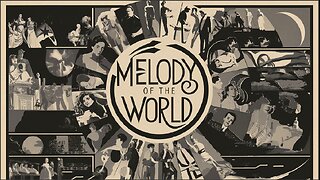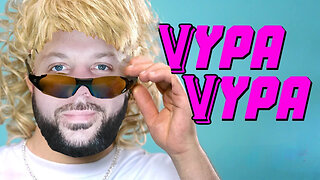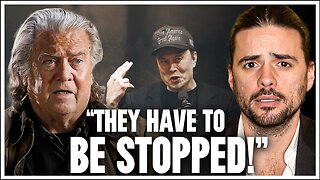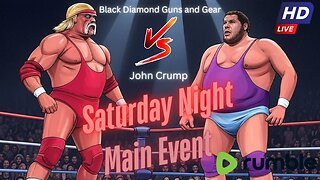Premium Only Content

THE STARS LOOK DOWN (1940) Michael Redgrave, Margaret Lockwood & Edward Rigby | Drama | B&W
The Stars Look Down is a British film from 1940, based on A. J. Cronin's 1935 novel of the same title, about injustices in a mining town in North East England. The film, co-scripted by Cronin and directed by Carol Reed, stars Michael Redgrave as Davey Fenwick and Margaret Lockwood as Jenny Sunley. The film is a New York Times Critics' Pick and is listed in The New York Times Guide to the Best 1,000 Movies Ever Made.
SYNOPSIS
In a small coal-mining village, Robert "Bob" Fenwick leads a strike over safety concerns at Neptune Colliery, despite opposition from their union and the owner, Richard Barras. The miners face hunger and desperation during the strike, which ends when some resort to looting a butcher's shop, leading to Bob's arrest. His son, David ("Davey"), leaves for university, aiming to return one day to improve working conditions.
While at university, Davey encounters Joe Gowlan, now a bookmaker. They meet Jenny Sunley, Gowlan's acquaintance, at a restaurant. Jenny tries to impress Davey, but he remains unswayed. Davey secures a job through Stanley Millington and eventually deserts Jenny for Laura Millington's influence. Jenny, discontented with Davey's low income, persuades him to abandon university for a teaching position.
Davey's unorthodox teaching style leads to dismissal, and he discovers Gowlan's shady deal with Barras to mine in a dangerous area. Davey's attempts to rally the trade union against this backfire when Jenny and Gowlan's renewed connection raises doubts about his motives. The mining operation proceeds, resulting in a catastrophic disaster at the colliery.
CAST & CREW
Michael Redgrave as David "Davey" Fenwick
Margaret Lockwood as Jenny Sunley
Emlyn Williams as Joe Gowlan
Nancy Price as Martha Fenwick
Allan Jeayes as Richard Barras
Edward Rigby as Robert "Bob" Fenwick
Linden Travers as Mrs. Laura Millington
Cecil Parker as Stanley Millington
Milton Rosmer as Harry Nugent, MP
George Carney as Slogger Gowlan
Ivor Barnard as Wept
Olga Lindo as Mrs. Sunley
Desmond Tester as Hughie Fenwick
David Markham as Arthur Barras
Aubrey Mallalieu as Hudspeth
Kynaston Reeves as Strother
Clive Baxter as Pat Reedy
James Harcourt as Will
Frederick Burtwell as Union Official
Dorothy Hamilton as Mrs. Reedy
Frank Atkinson as Miner
David Horne as Mr. Wilkins
Edmund Willard as Mr. Ramage
Ben Williams as Harry Brace
Scott Harrold as Schoolmaster Strother (as Scott Harold)
Narrated by: Lionel Barrymore (in the US version)
Directed by: Carol Reed
Screenplay by: A. J. Cronin, J.B. Williams
Based on: "The Stars Look Down" by A. J. Cronin
Produced by: Isadore Goldsmith, Maurice J. Wilson
Cinematography: Mutz Greenbaum, Ernest Palmer
Edited by: Reginald Beck
Music by: Hans May
Production Company: Grafton Films
Distributed by: Metro-Goldwyn-Mayer (US), Grand National Pictures (UK)
Release Date: January 22, 1940 (UK)
Running Time: 110 minutes
Country: United Kingdom
Language: English
NOTES
Filming for "The Stars Look Down" involved a week at Great Clifton and St Helens Colliery in Cumberland, followed by seven weeks at Denham and Twickenham Studios in London, where an elaborate pithead was simulated. Additional shots were taken at Derwent Crossings and Workington Central railway station. The production later moved to Shepperton Studios for another week, utilizing the original pithead set to create a massive composite set spanning 40,000 square yards, the largest exterior set for a British film at the time. The set included replicas of the Workington pit, miners' cottages, and used pit ponies and authentic costumes. Margaret Lockwood had a rare character role in the film and expressed concerns about her character's fidelity, but the director and producers ultimately retained the character as originally written.
The British and U.S. versions of "The Stars Look Down" differ in several significant ways. In the U.S. version, opening and end credits were modified, and a voiceover narration by Lionel Barrymore was added. The opening credits in the U.S. version are simpler, lacking the impactful scenes of the pithead and striking miners seen in the original.
The ending of the U.S. version features a rising camera shot above the pit with added verses of the Lord's Prayer and heavenly imagery, whereas the original version ends more subtly with the beginning of the Lord's Prayer and a poignant scene between Davey and his mother. In this original ending, Davey, dressed in a suit instead of work clothes, reveals he's joining the union to his mother, who expresses her love and concern for him. The film concludes with Davey departing, observed by his mother from the cottage window.
-
 48:07
48:07
Lost n Found Films
15 hours agoMELODY OF THE WORLD (1929)Ivan Koval-Samborsky, Renée Stobrawa & Grace Chiang|Short|B&W|Classic film
54 -
 18:55
18:55
GBGunsRumble
19 hours agoGBGuns Range Report & Channel Update 15FEB25
3.57K -
 13:31:32
13:31:32
iViperKing
20 hours agoGood Times + Good Energy Ft. Whez.. #VKGFAM #RRR
92.4K13 -
 12:24
12:24
Winston Marshall
1 day agoWOAH! Bannon just Revealed THIS About MUSK - The Tech-Right vs MAGA Right Civil War Ramps Up
219K307 -
 7:33:46
7:33:46
Phyxicx
19 hours agoRaid & Rant with the FF14 Guild on Rumble! Halo Night just wrapped up! - Go Follow all these great guys please! - 2/15/2025
147K4 -
 10:42:19
10:42:19
Reolock
21 hours agoWoW Classic Hardcore (LVL 60) | RAID DAY | Rumble FIRST HC Raid
94.1K5 -
 3:10:03
3:10:03
Barry Cunningham
18 hours agoTRUMP WEEKEND BRIEFING! MORE WINNING...MORE LEFTIES LOSING IT!
85.1K43 -
 2:20:09
2:20:09
Tundra Tactical
17 hours ago $3.71 earnedIs Trumps Executive Order A Second Amendment Wishlist???: The Worlds Okayest Gun Live Stream
56.7K2 -
 2:33:51
2:33:51
John Crump Live
22 hours ago $29.17 earnedSaturday Night Main Event!
155K16 -
 13:57
13:57
TimcastIRL
1 day agoTrump NUKES IRS After DOGE Investigation, OVER 9000 Employees To Be FIRED
160K195